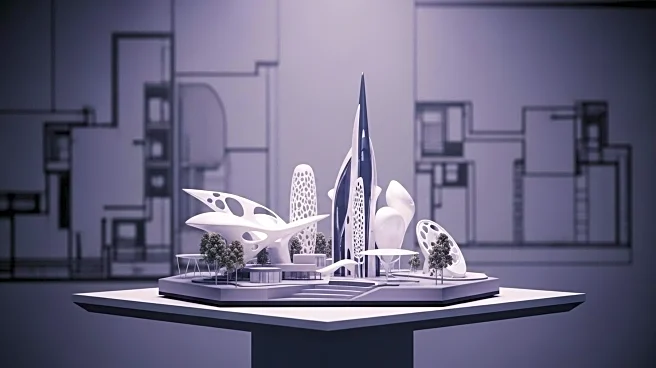What's Happening?
Lebanese architect Lina Ghotmeh has been named on the Time100 Next list, which highlights the world's 100 most influential rising stars. Ghotmeh, known for her innovative architectural designs, is the only architect featured on this year's list. Her recent achievements include designing the Bahrain Pavilion for Expo 2025 Osaka and winning a competition to renovate the British Museum's Western Range galleries in London. Ghotmeh's work is characterized by a blend of simplicity, boldness, and a respect for tradition with a contemporary twist. She founded her architecture studio in Paris in 2016 and has since completed notable projects such as the Serpentine Pavilion and a workshop for Hermès in France.
Why It's Important?
Lina Ghotmeh's inclusion in the Time100 Next list underscores her growing influence in the field of architecture. Her recognition highlights the increasing global appreciation for innovative and culturally sensitive architectural designs. Ghotmeh's work not only contributes to the aesthetic and functional aspects of architecture but also promotes cultural dialogue and sustainability. Her projects, such as the renovation of the British Museum, have the potential to impact public engagement with historical and cultural institutions. This recognition may open further opportunities for Ghotmeh to influence architectural practices and inspire emerging architects worldwide.
What's Next?
Following her recognition, Lina Ghotmeh is likely to gain more visibility and opportunities in the architectural world. Her upcoming projects, including the Qatar pavilion at the Venice Architecture Biennale, will be closely watched by industry professionals and the public. As she continues to take on high-profile projects, Ghotmeh may influence trends in sustainable and culturally integrated architecture. Her work could inspire a new generation of architects to prioritize innovative design solutions that respect cultural heritage and promote environmental sustainability.
Beyond the Headlines
Lina Ghotmeh's work raises important questions about the role of architecture in cultural preservation and innovation. Her projects often reflect a deep understanding of the cultural contexts in which they are situated, suggesting a model for how architecture can bridge past and present. This approach may encourage architects to consider the broader social and cultural implications of their work, potentially leading to more inclusive and thoughtful design practices. Ghotmeh's recognition could also spark discussions about the representation of women and diverse voices in the architecture industry.








